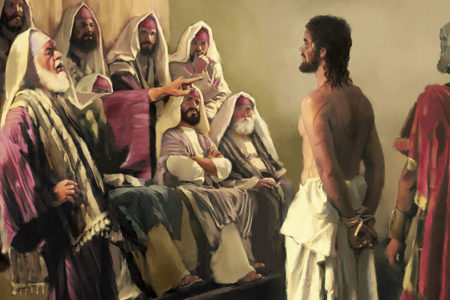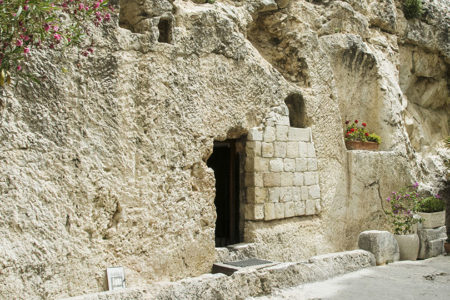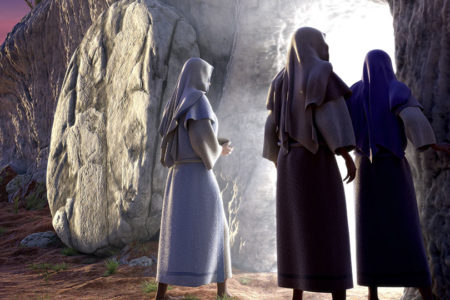Warning Against Antichrists
1 John 2:18–29
At the inception of his epistle, the apostle John declared, “God is light” (1 Jn. 1:5). He said people who walk in God’s light abide in fellowship with Him. They continually confess and forsake personal sin (1:8—2:2), keep God’s New Testament commandments (2:3–11), and do not pattern their lives after the world’s ungodly system (vv. 12–17).
In the final verses of chapter 2 (vv. 18–29), John warned believers about the presence of deceptive men within the church. He called these false teachers “antichrists” because they denied that Jesus Christ is God. They had disrupted the church fellowship, twisted John’s teachings, and caused major discord and division within the body of Christ.
This epistle equips the faithful, instructing them on how to overcome such deceivers through Christ’s teachings and the power of God’s Spirit.
Deception of Antichrists
John wrote, “Little children, it is the last hour; and as you have heard that the Antichrist is coming, even now many antichrists have come, by which we know that it is the last hour” (v. 18).
The phrase little children includes all the believers John mentioned in verse 12. Some probably were young in the faith. Others probably were older believers who had not grown to maturity. Such Christians would be particularly susceptible to antichrists peddling false doctrine.
John reminded his readers it was the “last hour”—a new, critical time within the church (v. 18). The definite article (the) is not in the original Greek text. Thus the emphasis is not on a definite time but, rather, on the characteristics of the “last hour” leading up to the Great Tribulation, the seven years immediately preceding Christ’s return. Since John’s day, the church has been aware of the eschatological time that could soon envelop the earth.
A sign of the “last hour” is that the “Antichrist is coming” (v. 18). John’s readers had already heard that someone called the Antichrist will come. Scripture is replete with teaching about him by Jesus Christ (Mt. 24:5, 11, 23–24), the apostle Paul (2 Th. 2:3–4, 8–9), and John himself (Rev. 13:1–10; 19:19–20).
The word Antichrist is composed of two Greek words: anti, meaning “against” or “instead of,” and Christos, Greek for “anointed.” The English word for Christos is Christ. The Antichrist is identified in Scripture as the “prince who is to come” (Dan. 9:26); “a vile person” (11:21); and “man of sin,” “son of perdition,” and “lawless one” (2 Th. 2:3, 8), which all speak of his extreme wickedness. When the Antichrist appears, he will demand that the world worship him as God.
John continued, “We know that it is the last hour” (1 Jn. 2:18). How do we know? When John penned this epistle, many people had been labeled as antichrists because they denied Jesus’ deity. Today the spirit of antichrist that permeates the world emanates from those who deny Christ. What was true back then is still true today.
The apostle then said, “They went out from us, but they were not of us; for if they had been of us, they would have continued with us; but they went out that they might be made manifest, that none of them were of us” (v. 19).
Because John’s readers knew the situation, he did not go into detail. It was a historical moment for the church when these heretics “went out,” indicating they openly rejected the church’s teaching concerning Christ’s deity. They were not asked to leave but did so on their own. These people should not be considered backsliders because they were never born again, and their departure gave conclusive evidence that they were not true believers.
Divine Anointing
John reminded his readers of the many resources available to them to counter the onslaught of antichrists: “But you have an anointing from the Holy One, and you know all things. I have not written to you because you do not know the truth, but because you know it, and that no lie is of the truth” (vv. 20–21).
First, is the “anointing from the Holy One” (v. 20). This refers to the Holy Spirit of God given to each believer at the time of salvation (Jn. 14:26–27; 16:13; Rom. 8:9). Believers who are controlled by the Holy Spirit will receive the direction and discernment they need to avoid deceptions.
Second, they “know all things” (1 Jn. 2:20), better translated “you all know.” In other words, through the indwelling Spirit, believers receive the ability to know God’s truth through His Word and detect error.
Third, John reassured his readers of their actual knowledge of God’s “truth” (as it is embodied in Christ), which was taught to them (v. 21). He reinforced this statement by saying “and that no lie is of the truth” (v. 21). Truth and lies cannot coexist. Knowing God’s truth in its purity garrisons Christians against lies.
Fourth, John explained how Christians can identify someone who possesses a spirit of antichrist: “Who is a liar but he who denies that Jesus is the Christ?” (v. 22). Such denial is a clear attack on Jesus Christ as the incarnate Son of God who is declared as the God-Man in Scripture (cf. Heb. 1:1–3). In John’s day, antichrists included Gnostics, Docetics, and Cerinthians. (See “The First Epistle of John: Introduction” in the March/April 2013 issue of Israel My Glory.) Scripture is clear: “Whoever denies the Son does not have the Father either” (1 Jn. 2:23).
Direct Appeal
John commanded his readers to abide in the truth that he imparted to them: “Therefore let that abide in you which you heard from the beginning. If what you heard from the beginning abides in you, you also will abide in the Son and in the Father” (v. 24). The Holy Spirit’s abiding presence in the lives of believers assures them they abide in both God the Father and Jesus, the Son of God.
Those who abide in Christ have received the promise and blessing of “eternal life” (v. 25) through Jesus Christ (cf. Jn. 3:14–15, 36; 4:14; 5:24; 6:40, 47; 10:28; 17:2–3). Eternal life is a possession bestowed now that extends throughout eternity.
In the next verses, the apostle summarized what he taught: “These things I have written to you concerning those who try to deceive you” (1 Jn. 2:26). The phrase these things might well refer to John’s entire letter, but most likely it refers to the information about the antichrists (vv. 18–25).
He warned Christians to put up a defense against the craftiness and corruption of the antichrists’ heresies. Even today one must continually guard against cults, which twist the truth about Christ’s deity by weaving in their own heresy and denying that Christ is truly both God and man.
John reminded his readers, “The anointing which you have received from Him abides in you, and you do not need that anyone teach you” (v. 27). The Holy Spirit who indwells true believers will endow and equip them to stand against the deception of antichrists. The apostle is not saying believers no longer need teachers of God’s Word. He, in fact, is a teacher throughout the epistle. Teachers are a gift to the church (Eph. 4:11; 2 Tim. 1:11). John simply was emphasizing that the indwelling Holy Spirit enables believers to recognize deception.
The last section of 1 John 2:27 provides two reasons to trust the anointing of the Holy Spirit:
- It teaches believers “all things” relating to the truth of God’s Word.
- It is “true, and is not a lie.” In other words, the anointing is not false or counterfeit like the claims of heretics.
Therefore, since the truth of God’s Word has been “taught” to them through the personal anointing of the Holy Spirit, John is commanding his readers to “abide [remain] in Him [Jesus Christ]” (v. 27).
With the phrase And now, little children, abide in Him (v. 28), John again commanded believers to maintain a close, intimate, fellowship with Christ so they would not wander away from Him.
Another reason to abide in Christ is “that when [literally, “if” ] He [Christ] appears [is revealed], we may have confidence and not be ashamed before Him at His coming” (v. 28). The word if does not express doubt concerning Christ’s return. Rather, it states that the time of His return is unknown.
The first-century church was well aware that Christ promised to return to rapture it away (Jn. 14:1–3). In fact, the any-moment return of the resurrected Christ has been the continual hope of all true believers (1 Th. 4:13–18) throughout church history.
Those who abide in Christ will have the “confidence” [assurance and boldness] (1 Jn. 2:28) to appear before Him when He is revealed because of their intimate relationship with Him. In that day they will “not be ashamed [literally, “put to shame”] before Him at His coming” (v. 28). They will not feel disgraced, ashamed, or fearful of divine judgment.
Distinct Application
John closed this section with a word on what sets Christians apart from antichrists: “If you know that He is righteous, you know that everyone who practices righteousness is born of Him” (v. 29). The conditional word if should be translated “since.” That is, “Since you know or have personal knowledge that God the Father is righteous, you also know that those who are ‘born of Him’ practice a life of habitual righteousness.”
The word righteousness declares God’s character and conduct. The word could refer to the nature of God the Father or Jesus Christ. Scholars differ, but most believe it refers to God the Father within this context.
In verse 29 John mentioned the new birth for the first time in this epistle (cf. 3:9; 4:7; 5:1, 4, 18). The visual sign of being born again is living a righteous life. “Everyone” (without exception) who is born again habitually practices righteousness.
However, living righteously does not bring about the new birth; genuine righteousness comes from being born again. Many people are morally upright and do benevolent works for humanity. But that does not mean they are righteous in God’s eyes; nor do their good deeds indicate they are born again or were motivated by a righteous life lived out in Christ.
The one mark that distinguishes antichrists from true believers is that they do not practice true righteousness that is energized by the Holy Spirit. Do not be deceived; by their fruits you shall know them.







